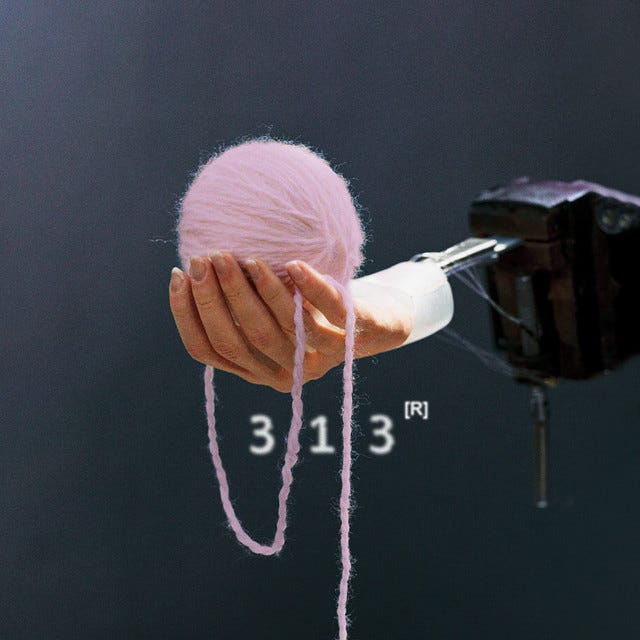Things Uncontainable
Including slow motion, 313, tree time, future tense memories, and forgiveness
Hola mi gente,
The band My Morning Jacket released their newest album is last month. The first thing that usually grabs me about an album is how it sounds. But shortly afterward, with a few more listens, I start to pick up on specific lyrics and broader themes that may be unifying the collection of songs, especially if I listen to the album while exercising. A running theme throughout MMJ’s new album is the passage of time. I had a thought that the track “Beginning From The Ending” would pair well with Djo’s “End of Beginning,” so I decided to make a mix with these two songs as bookends. I recently read Mexican poet Octavio Paz’s “The Day of the Dead,” part of his book The Labyrinth of Solitude, in which he presents la fiesta as an essential act of identity—one that weaves together heavy themes of time, mortality, and paradox. I tried to pull in other songs that embody the sentiments Paz so eloquently expresses—embracing each fleeting moment, celebrating life while playfully facing death, and experiencing the fullness of self and love with all their contradictions. So it felt fitting to call the mix La Fiesta de Paz. I hope you’ll check it out and pay attention to it—while you still have time.
Here are 5 more thoughts on time that I wanted to share with you:
I thought a lot about themes of time, life, and death in music this week. One song that almost immediately came to mind was “All The Time” by the band Bahamas. The music video for the song has a cool slow-motion effect. To make a video like this, the band is recorded playing the song faster than normal. The audio is taken out and the video is then slowed down until it matches the original audio of the song. The resulting effect is that the band appears to be playing in slow motion while still syncing up to the original song playing at normal speed. Weezer made a similar music video in the mid-’90s for their song “Undone - The Sweater Song.” It was directed by Spike Jonze and later included on The Work of Director Spike Jonze—an excellent documentary from the Director’s Label series that I remember watching many times when it came out over 20 years ago. To this day, if I happen upon a music video from the DVD, I can usually identify it as Jonze’s handiwork. It was strange listening to Weezer’s “Sweater Song” this week after reading Octavio Paz’s writings on la fiesta and time. Throughout the song, the protagonists keep talking about going to a party, and then, of course, there’s the unraveling thread of the sweater.

Cover for Residente’s single “313” Last year, Puerto Rican rapper Residente released his second solo album LAS LETRAS YA NO IMPORTAN (Lyrics No Longer Matter). The title begs the question: “Lyrics no longer matter to whom?”—because they matter a great deal to Residente. He’s an expert wordsmith. One of the singles from the album was a song called “313,” the cover of which features a robotic hand holding a ball of thread beginning to unwind. Residente wrote the song as a tribute to his dear friend, Valentina Gasparini, who passed away unexpectedly in 2022. After her death, the number 313 seemed to appear to Residente everywhere, and he interpreted it as an ongoing emotional connection with Valentina. Along with the song, Residente released a self-directed music video that masterfully evokes Paz’s themes of time, mortality, and la fiesta in extraordinary fashion. It recently won the award for Best Short Form Music Video at the Latin Grammys. The video features Spanish actress Penélope Cruz, who opens the song reciting these lines, as we see dancers dramatically flying backwards in slow motion:
We are like a coil of thread coming undone, loosening
A cord that unties to discover the day with eyes wide awake
We are born and learn to be children of time[…]
And if the world moves, we all move
That is why we must die so that others may be born
So that nothing stops
So that everything always begins
But everything that begins, at some point ceases to exist
That’s why we must live without missing anything
Awake without blinkingJust as windows open to welcome in the sun
Until the heart explodes
Until they have to take us from the partyOnce Residente starts singing, there’s an ongoing interplay between the dancers, Penélope, and himself that we see unfold, along with flashes of symbolic imagery lasting mere seconds. Just before the video’s most climatic moment, Catalan vocalist Silvia Pérez Cruz adds her beautifully rich voice, singing repeatedly in Spanish, “I don’t want it to end. You are so much that you cannot be contained.” And as the moment finally arrives, the violin of Noemi Gasparini—the sister of Valentina, who herself was a violinist—carries us off into the clouds. The whole thing is quite breathtaking and invites multiple interpretations. Even if you don’t understand Spanish, it’s sure to bring a cathartic tear to your eye and a feeling that you’ve just witnessed something profound.
I’m still reading at least a chapter a day from Katie Holten’s The Language of Trees. There’s a section of the book called “Tree Time” that provides some good perspective on human longevity compared to that of the natural world. The section reminded me of a favorite song of mine by Charlie Parr called “Over The Red Cedar,” in which he repeats in the chorus, “It’s outlasting you, Lord.” In Holten’s book, Scottish artist Katie Paterson’s chapter describes her project Future Library, a kind of literary time capsule. Every year for one hundred years, from 2014 to 2114, a renowned author will be selected to submit a manuscript to the library, located in Oslo, Norway. But the works will not be unveiled until the project’s end in 2114, at which point all of them will be printed on paper from 1,000 trees that have been planted just outside of Oslo for this exact purpose. Another chapter by Amy Franceschini describes the work of Future Farmers, a group of diverse practitioners who seek to repurpose wood with attention to both the time and place it came from.
As a lover of languages and all things related to time travel, I was fascinated by the movie Arrival, directed by Denis Villeneuve. It wasn’t until years later that I found out the movie was based on Ted Chiang’s “Story of Your Life,” from his collection Stories of Your Life and Others. Chiang’s short stories are soulful science fiction and have so much going on that they can be developed into feature films. If you read “Story of Your Life,” you’ll notice pretty quickly that the protagonist describes memories of her daughter using the future tense of verbs. It gets at something science author James Gleick writes about in Time Travel: A History:
We say that memory ‘takes us back.’ Virginia Woolf called memory a seamstress ‘and a capricious one at that.’ … ‘I can’t remember things before they happen,’ says Alice, and the Queen retorts, ‘It’s a poor sort of memory that only works backwards.’
On my La Fiesta de Paz mix, I included a new song from Lucy Dacus called “Lost Time,” which has the lyric, “But I will, I would, I did, I do.” This sentiment from Dacus complements the notion of non-linear time that Chiang presents in his story and how it impacts our choice to love, even if it hurts. If you’ve already seen the movie, I recommend checking out this video on the excellence of Villeneuve’s adaptation.
Musician Nick Cave runs a website called The Red Hand Files that offers a space for anyone to submit him questions—and people do. Each week, Cave receives an array of questions that he says range from “the playful to the profound, the deeply personal to the flat-out nutty.” Subscribing to his newsletter is free and entails getting an email from Cave about once a week, in which he answers one or two of them. For “Issue #316,” Cave addresses two questions with one answer. The first question seeks Cave’s advice for how to forgive a friend, and the second asks about the truthfulness of an off-hand remark Cave made about the Red Hot Chili Peppers decades ago. To answer both questions, Cave writes about RHCP’s bassist Flea. He describes him as a “human being of an entirely different calibre, indeed, of a higher order.” He shares some moments where he and Flea have connected over the years on different projects—including, most recently, a new trumpet album that Flea is apparently making. He even recounts how Flea once spoke calming words of love and respect to a bear blocking his path while hiking the backcountry of Yosemite. With his affecting comments about Flea, Cave ends up answering the first question without ever addressing it directly. Like most of Cave’s thoughtful responses, it provokes a moment of self-reflection—where can I let go and forgive while I still have the time to do so? For more on forgiveness, check out Cave’s reading of Maria Popova’s poem titled “Forgiveness.”
Thank you all for reading! I hope you found some inspiration for today’s moments, whatever they might be. If you enjoyed reading, go ahead and click subscribe to receive future newsletters.
If you know someone who might be interested in receiving this newsletter, please feel free to pass it along.
Be well and I hope to see you down the road sometime soon!
Eric







Thank for the good read! See you soon brother!